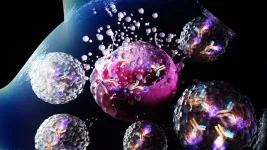(Press-News.org)
More than half of women ages 30 to 35 are already suffering moderate to severe symptoms associated with menopause, yet most women are waiting decades before seeking treatment, new research from UVA Health and the Flo women’s health app reveals.
The research sheds important light on “perimenopause,” the transition period leading to menopause. Many women in perimenopause assume they’re too young to be suffering symptoms related to menopause, believing that symptoms won’t appear until they reach their 50s. But this mistaken belief, the researchers say, only causes women to suffer in silence.
“Physical and emotional symptoms associated with perimenopause are understudied and often dismissed by physicians. This research is important in order to more fully understand how common these symptoms are, their impact on women and to raise awareness amongst physicians as well as the general public,” said study co-author Jennifer Payne, MD, an expert in reproductive psychiatry at UVA Health and the University of Virginia School of Medicine. “Knowing this type of progression of perimenopause-associated symptoms can help both women and their doctors know what to expect as women enter the perimenopausal portion of their lives.”
Understanding Perimenopause
The new study analyzes symptoms self-reported by more than 4,400 American women ages 30 and older who responded to a survey conducted online and in the Flo app. Among women 30 to 35, 55.4% reported symptoms that meet the criteria for “moderate” or “severe” on the widely used Menopause Rating Scale (MRS). This number increased to 64.3% among women 36 to 40. Yet most women don’t seek treatment for menopause symptoms until they are 56 or older.
“We had a significant number of women who are typically thought to be too young for perimenopause tell us that they have high levels of perimenopause-related symptoms,” said Liudmila Zhaunova, PhD, director of science at Flo. “It’s important that we keep doing research to understand better what is happening with these women so that they can get the care they need.”
The researchers found that psychological symptoms, such as anxiety, depression and irritability, took hold long before physical symptoms. These symptoms reached their peak among women ages 41-45, then ebbed to their lowest in women ages 56 and over.
Physical problems such as sexual problems, bladder issues and vaginal dryness peaked in women 51 and older. These types of problems were lowest in women ages 30 to 35.
Some of the symptoms most classically associated with menopause, such as hot flashes and sweating, peaked at ages 51 to 55 and were lowest among women 30 to 35.
The researchers hope their results will help fill what they call an “alarming gap” in our understanding of perimenopause, improving care and support for women approaching menopause.
“This study is important because it plots a trajectory of perimenopausal symptoms that tells us what symptoms we can expect when and alerts us to the fact that women are experiencing perimenopausal symptoms earlier than we expected,” Payne said.
Findings Published
The researchers have detailed their findings in npjWomen’s Health. The research team consisted of Adam C. Cunningham, Yella Hewings-Martin, Aidan P Wickham, Carley Prentice, Payne and Zhaunova. Payne is a consultant for Flo Health; a full list of the authors’ disclosures is included in the paper.
To keep up with the latest medical research news from UVA, subscribe to the Making of Medicine blog at http://makingofmedicine.virginia.edu.
END
Rebels of health care use technology to connect with clinicians, information, and each other
Cambridge, MA – February 25, 2025 – The future of health care is being forged in the crucible of rare disease. A new survey led by Susannah Fox, author of Rebel Health: A Field Guide to the Patient-Led Revolution in Medical Care (The MIT Press), finds that 15% of U.S. households are affected by rare disease or an undiagnosed illness. Their lives are characterized by extreme stress, often matched by their resourcefulness.
“People living with rare diseases push the edges of what is possible by using technology ...
The Beatles said it best: Love is all you need. And according to new research from The Australian National University (ANU), the same is true in the animal kingdom. Well, at least for mosquitofish – a matchstick-sized fish endemic to Central America and now found globally.
According to the ANU scientists, male mosquitofish possess impressive problem-solving skills and can successfully navigate mazes and other tests. Males that perform better have a higher chance of mating.
Lead author Dr Ivan Vinogradov said male mosquitofish ...
Mars is easily identifiable in the night sky by its prominent red hue. Thanks to the fleet of spacecraft that have studied the planet over the last decades, we know that this red colour is due to rusted iron minerals in the dust. That is, iron bound up in Mars’s rocks has at some point reacted with liquid water, or water and oxygen in the air, similar to how rust forms on Earth.
Over billions of years this rusty material – iron oxide – has been broken down into dust and spread all around the planet by winds, a process that continues today.
But iron ...
Statement Highlights:
It is essential for health care professionals to routinely screen pregnant and postpartum women for depression and anxiety, address modifiable risk factors and consider behavioral and pharmacological interventions to improve long-term maternal health outcomes.
Multidisciplinary care teams, including psychologists and other behavioral health professionals, are important to monitor and provide appropriate mental health support during pregnancy and after birth.
The new ...
New research from Emory University indicates that childhood trauma physically alters the hearts of Black women.
The study, which examined the relationship between childhood exposure to trauma and vascular dysfunction among more than 400 Black adults in Atlanta ages 30 to 70, found that women who experienced childhood trauma had a worse vascular function, a preclinical marker of heart disease, while men had none. In addition, the findings show women may be more vulnerable to a larger cumulative stress burden, eliciting varying physiological ...
PROVIDENCE, R.I. [Brown University] — Mars has captivated scientists and the public alike for centuries. One of the biggest reasons is the planet’s reddish hue, earning the third rock from the sun one its most popular nicknames — the “Red Planet.” But what exactly gives the planet its iconic color? Scientists have wondered this for as long as they’ve studied the planet. Today, they may finally have a concrete answer, one that ties into Mar’s watery past.
Results from a new study published in the journal Nature Communications and led by researchers from Brown University and the University of Bern suggest that the water-rich iron mineral ...
Despite what was previously thought, new research has shown that genetic changes alone cannot explain why and where tumours grow in those with genetic condition neurofibromatosis type 1 (NF-1). Understanding more about the factors involved could, in the future, facilitate early cancer detection in NF-1 patients and even point towards new treatments.
Researchers from the Wellcome Sanger Institute, UCL Great Ormond Street Institute of Child Health, Great Ormond Street Hospital, Cambridge University Hospitals NHS Foundation Trust, and their collaborators, focused on NF-1, a genetic condition that causes ...
One particular challenge in the treatment of cancer is therapy resistance. An international research team has now discovered a mechanism that opens up new treatment strategies for tumours in which conventional chemotherapeutic agents have reached their limits. "Cytotoxic agents from nature lead to an increased incorporation of polyunsaturated fatty acids into the membrane of cancer cells. This makes them more susceptible to ferroptosis, a type of cell death, at a very early stage," reports Andreas Koeberle, a pharmacist at the University of Graz and lead author of the study, which has just been published in the scientific journal Nature ...
New York, NY—Feb. 25, 2025— By watching their own motions with a camera, robots can teach themselves about the structure of their own bodies and how they move, a new study from researchers at Columbia Engineering now reveals. Equipped with this knowledge, the robots could not only plan their own actions, but also overcome damage to their bodies.
"Like humans learning to dance by watching their mirror reflection, robots now use raw video to build kinematic self-awareness," says study lead author Yuhang Hu, a doctoral student at the Creative Machines Lab at Columbia University, directed by Hod Lipson, James and Sally Scapa Professor of Innovation and chair of the Department ...
HOUSTON ― Researchers at The University of Texas MD Anderson Cancer Center have developed a novel antibody-toxin conjugate (ATC) designed to stimulate immune-mediated eradication of tumors. According to preclinical results published today in Nature Cancer, the new approach combined the benefits of more well-known antibody-drug conjugates (ADCs) with those of immunotherapies.
ADCs have emerged as a breakthrough in recent years due to their modular design, which enables precise delivery of therapies to tumors by targeting specific proteins expressed on cancer cells. These conjugates ...







